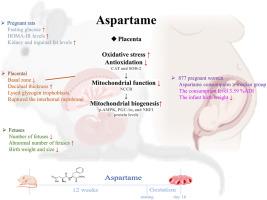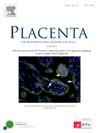Aspartame intake during pregnancy induces placental dysfunction through impaired mitochondrial function and biogenesis modulation
IF 3
2区 医学
Q2 DEVELOPMENTAL BIOLOGY
引用次数: 0
Abstract
Introduction
Aspartame is a nonnutritive sweetener (NSS), which is widely used in foods and beverages worldwide. The safety of aspartame, a commonly used artificial sweetener, has been debated. Here, we investigated the potential effects and underlying mechanisms of aspartame consumption during pregnancy on placental dysfunction and birth outcomes.
Methods
Female Sprague Dawley rats were exposed to a low (30 mg/kg) or high (60 mg/kg) dose of aspartame before and during pregnancy; moreover, we assessed placental histopathological structure, oxidative stress markers, and mitochondrial function. In addition, we explored how aspartame affects birth weight in a human maternal–infant cohort.
Results
In animal study revealed that aspartame treatment of female rats for 14 weeks (12 week before pregnancy and 18 days of gestation) causes a significant reduction in the number and weight of fetuses, as well as damage to placental structure. These effects are linked to increased oxidative stress in the placenta, possibly damaging placental trophoblasts, impairing mitochondrial function, and initiating a compensatory mitochondrial biosynthesis mechanism. In the human pregnant cohort revealed that aspartame reduces birth weight considerably.
Discussion
These findings suggested the potential risks associated with aspartame consumption during pregnancy. Therefore, the safety of aspartame, particularly in pregnant individuals, should be reconsidered; specifically, tailored, acceptable daily intake guidelines should be developed for aspartame in different populations.

孕期摄入阿斯巴甜会通过线粒体功能受损和生物生成调节诱发胎盘功能障碍。
简介:阿斯巴甜是一种非营养性甜味剂(NSS),在世界各地的食品和饮料中被广泛使用。阿斯巴甜是一种常用的人工甜味剂,其安全性一直备受争议。在此,我们研究了孕期服用阿斯巴甜对胎盘功能障碍和分娩结局的潜在影响及其内在机制:方法:雌性 Sprague Dawley 大鼠在妊娠前和妊娠期间暴露于低剂量(30 毫克/千克)或高剂量(60 毫克/千克)的阿斯巴甜;此外,我们还评估了胎盘组织病理学结构、氧化应激标记物和线粒体功能。此外,我们还在人类母婴队列中探讨了阿斯巴甜对出生体重的影响:动物实验表明,对雌性大鼠进行为期 14 周(孕前 12 周和妊娠 18 天)的阿斯巴甜处理会导致胎儿数量和体重显著下降,并对胎盘结构造成损害。这些影响与胎盘氧化应激增加有关,可能会损害胎盘滋养细胞,损害线粒体功能,并启动线粒体生物合成补偿机制。在人类孕妇队列中发现,阿斯巴甜会大大降低出生体重:讨论:这些研究结果表明,在怀孕期间食用阿斯巴甜具有潜在风险。因此,应重新考虑阿斯巴甜的安全性,特别是对孕妇的安全性;具体而言,应针对不同人群制定有针对性的、可接受的阿斯巴甜每日摄入量指南。
本文章由计算机程序翻译,如有差异,请以英文原文为准。
求助全文
约1分钟内获得全文
求助全文
来源期刊

Placenta
医学-发育生物学
CiteScore
6.30
自引率
10.50%
发文量
391
审稿时长
78 days
期刊介绍:
Placenta publishes high-quality original articles and invited topical reviews on all aspects of human and animal placentation, and the interactions between the mother, the placenta and fetal development. Topics covered include evolution, development, genetics and epigenetics, stem cells, metabolism, transport, immunology, pathology, pharmacology, cell and molecular biology, and developmental programming. The Editors welcome studies on implantation and the endometrium, comparative placentation, the uterine and umbilical circulations, the relationship between fetal and placental development, clinical aspects of altered placental development or function, the placental membranes, the influence of paternal factors on placental development or function, and the assessment of biomarkers of placental disorders.
 求助内容:
求助内容: 应助结果提醒方式:
应助结果提醒方式:


